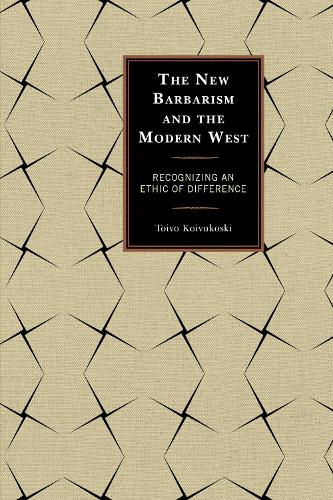
The New Barbarism and the Modern West: Recognizing an Ethic of Difference
(Hardback)
Publishing Details
The New Barbarism and the Modern West: Recognizing an Ethic of Difference
By (Author) Toivo Koivukoski
Bloomsbury Publishing PLC
Lexington Books
6th August 2014
United States
Classifications
Tertiary Education
Non Fiction
Social and political philosophy
320.01
Physical Properties
Hardback
150
Width 162mm, Height 239mm, Spine 17mm
372g
Description
Liberalism is being called into question both in practice and in principle, from insurgencies at its bloody hinterlands and from the illiberal responses those insurgencies engender within the so-called civilized world, with technological integration creating the conditions for new forms of barbarism. What then are the chances of progress towards a substantial equality of freedoms within this new context of retrograde attitudes framed by the occlusion of others as somehow essentially different How can we register the significances of cultural distinctions without letting those we's and they's split an emergent global civil society into parochial retro-nations, where belonging knows itself only by exclusion What is it that is being called out of the spirit of modernity in our seemingly backward-moving age of essentialized others and self-righteous rage And to the end of inter-cultural understanding, how can we come to know the other, both through the care of others and in ourselves This work of political theory reflects on how cultures imagine their barbarians in the form of essentialized others, focusing specifically on the kinds of barbarism associated with a civilization devoted to technological progress. In response to the excesses of modernity, the author looks to advances an ethic of difference, inverting the golden rule so as to do unto others as those others would do unto themselves.
Reviews
Our swiftly evolving globalized world marks both the end of history and geography heretofore known to us. This erosion and eclipse of time and space has resulted in great waves of human migration that have placed us face to face with the stranger, the barbarian. This is a new answer to the old question about what one should do when encountering the Other on our doorsteps. Here we are offered a new ethic for the old ethic, the ancient Code of Hospitality (x). Here Toivo Koivukoski is doing what he does best, offering new ways for seeing the old and extraordinary ways for seeing the ordinary. -- Tom Darby, Carleton University
Author Bio
Toivo Koivukoski is associate professor of political science at Nipissing University and director of the Nipissing University Peace Research Initiative.
